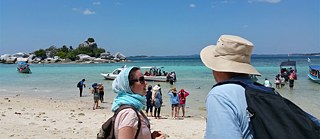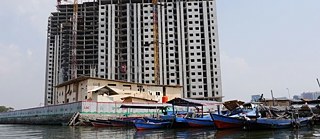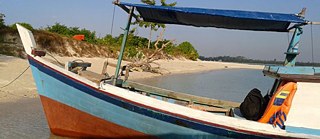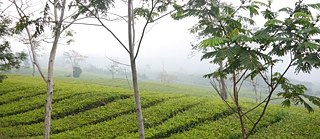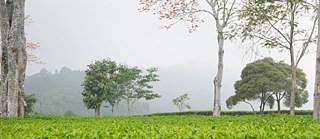Literature | Essay
Indonesia or we want it special
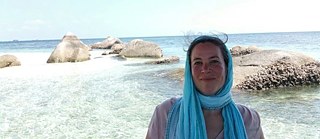
Each journey explores not only the “other” but also inevitably one’s own self, the expectations, misunderstandings and fears one brings along. In Indonesia I move through connections that I initially know only from reading: the largest Muslim population in the world, the search for post-colonial identity, the collective “1965” trauma, namely the mass murders of communists and those presumed to be, a theme that only a few years ago was freed from taboos and is now entering literature, film and the media. And suddenly you are right in the middle of it all. Any phenomenon – the smile, the sugar coating, the gentleness – could be the object of a lay psychoanalysis, and the ascetic task here is not to give in to temptation, not to set the concrete visible against the abstract known, neither to succumb to this naive encroachment nor to carelessly trust the disturbingly smooth surfaces.
Travelers and blogs warned me about Jakarta – an uninteresting Moloch of 12 million inhabitants – and perhaps the warnings come from the knowledge of the deception the sound of its name can produce: dark, mysterious, exotic. Jakarta has of course everything a metropolis needs: wide streets, traffic jams, steel and glass towers, modern malls, an upper class, a small and rather museum-like old town with a few Dutch colonial buildings. And then the poor districts, at the port for example, where the invariable other side of the world receives us on our first day, where the writer Antje Rávic Strubel and I begin.
Yet later, when the journey continues, I will think back to Jakarta as perhaps still the most familiar place to me. Even I, the fleeting visitor, have the impression that I see more here – perhaps I also simply recognize more again, familiar problem constellations from other emerging countries, maybe from Mumbai where I once lived.
It is night when we land. The air is full of noises that seem nearer in the heat, like how one’s own pulse is connected to the body. We are astonished to see our names. A slender man holds up a sign.
He speaks no German, no English, but the instructions given to him together with the sign are simple: take the two German women to the hotel. While the city spread out in front of us on the other side of the windshield like a tilled field, one could still believe that tomorrow we would again be walking down the street in Berlin. Days later, distance phobia is the term I use, or invent, I admit, for my fear – something like the fear of heights but in this case horizontalized. It may well be the fear of this incredible distance that took 15 flight hours; when I enter the route Jakarta-Berlin in Google Maps, the result is 15,000 kilometers and 245 hours of driving time “with light traffic”. It is the fear of not being able to return home at will. From India I would make it home on a bicycle in the event of an emergency. So I say. The driver’s silence seems to make the city around us silent.
In the first minutes I’m struck by the knowledge that we have to make an effort to do something here. Even if the Indonesians are very polite and helpful, as is immediately clear to me. What kind of encounters do I want to have? How do I imagine an encounter? This will be possible only with those who speak English. A small educated elite. The others will smile with us.
The hotel extends the feeling a little of moving through familiar internationalized space with just a touch of the foreign, like vapor on a window. Large, air-conditioned, roof-top swimming pool, electronic room cards. We have to wait unusually long to check in. The man at the desk stares worriedly at the screen and finally apologizes to us. He doesn’t have two rooms next to each other, but he does have two on the same floor. We laugh, relieved. He immediately laughs with us.
Being alone in this country is rather unusual. Later when I’m travelling alone, the question I’m always asked first is where my family is and where my friends are. The hands are not alone here either: everything is given with two hands, sometimes accompanied by a slight bow. The change, the goods. Now the room card. The gesture underlines the preciousness and vulnerability of things.
For breakfast there is a small selection of cheese (tiny portions under a glass bell, like an untouchable art ensemble). Later, in the mid-class hotels, often only a spoonful of grated cheese is stingily doled out for the omelet by the egg dishes cook, and for each additional spoonful you have to practically beg. At eight in the morning, instead of bread rolls, cheese and yoghurt, we are confronted with big silver tubs containing rack of lamb floating in brown sauce, chicken legs, shrimp, glossy soups with fish heads, nasi goreng with fried egg on top, and white rice porridge laced with nearly invisible puréed chicken meat (a vegetarian ambush). The fruit is art. A sculptor must have dedicated hours sculpting the watermelon and turning it into a demonic mask. Even the cut-out pieces are expressively modelled, like the reliefs on the Borobudur temple. Added to my admiration and grumble list: the tomato sauce for spaghetti napoli is diluted, heated ketchup; the all-purpose oyster sauce is applied to everything, which is why everything tastes slightly fishy; sugar has to be in fruit juices, coffee, and yoghurt; nuts, cookies, and chips taste of algae, fish and chili; everything is fried, roasted, prepared with sugar crusts, oil and aromas. In short: nothing is ever simply itself. “We want it special,” explains a young Indonesian woman to me, laughing amongst the aisles of shelves of the hypermarket where I search for something still somewhat in its natural state. There must be a small, hidden shelf somewhere for health freaks. But no, you have to get used to special. It is always special. With its 7 million diabetics, Indonesia ranks 7th in the world in this category.
Bule! We hear that often. It means “albino”, which is the name for fair-skinned foreigners. It is called out so clearly and so happily that I don’t want to believe it could infer disrespect (this is debated in the online expatriate communities). The joy seems great; something fits, word and image. Children shout it, adults call it out. In the slum, with Ronny Poluan, the word traces our steps.
Ronny is the founder of Jakarta Hidden Tours. He has been an actor, curator and film-maker, which may explain why it is not dreadful and dark tourism, but rather ingenious theater in which the visitor gradually becomes involved in the misery of others and is then suddenly confronted with oneself: with being privileged and expecting (also a privilege) to have time to observe and be able to think things over. You cannot escape, since Ronny is the implicit master of ceremonies, uncle and friend. He jokes with the people, he laughs, he creates good atmosphere wherever he goes. It is as if he simply introduces his friends to us, and then they are our friends too. Shake hands again and again. Bule! Passing trains rattling by, heat, odors, woks with sizzling something, baskets of dried fish. Garbage underfoot, laundry flapping in your face. A compressed, miniature world. The children attach themselves firmly to us. They push a soft finger into my hand, again practice their three sentences in English – Where do you come from? What’s your name? How old are you? – and I doggedly practice my tourist face, my white face, and feel what I do. “You must be rich,” says a man. We laugh defensively. “No, I am a writer, I am not rich,” I say. He says nothing, he just looks at the camera hanging in front of my stomach.
Then we cross a bridge over a river full of garbage where a family is camped – the leftover people. Shacks were here until recently, until bulldozers flattened them. The people were taken to social camps outside the city. “Locked up together with the mentally ill. Then I go there, speak with the guards and they are released.”
The controversial term “slum tourism” combines two words that do not fit together and therefore provoke. Tourism is an industry that promises profit, the slum promises misery. Ronny has been visited by many journalists. He knows all the objections and he lists them for us. Most of the criticism comes from his own country: that he discredits the country when he shows tourists the slums, that he commercially exploits misery. But Ronny does not give the impression that he wants to make himself important or that he wants to become rich.
At the end of the tour, three women pull us into a small dim room where we sit on the floor.
“I like your nose,” a woman says.
“Really?” I asked back.
“Yes. Not as short as ours.” I understand. It is about the identification of a long-nosed white person, not about my exceptionally beautiful nose. They ask whether we have husbands. “You have money, so you don’t need to marry.” When we ask back whether the only motive for marrying is economic improvement, they don’t seem to understand. I take a photo of Vania, an 11-year-old girl, who immediately assumes the usual camera pose here: the fingers in a victory sign and an MTV star smile. I ask how I can send her the photos. As printouts by post? Does she have e-mail?
“I’m on Facebook,” she says.
On the way back we come to an intersection where several boys stand on the edge of the road and watch the cars. One stops and a boy gets in. I’m told they are jockeys. According to law a car must be occupied by at least three persons here. The boys are rented until the control zone is over, and then they get out, run back and rent themselves again. Logic is undermined with logic. Some women also do this, and they sometimes rent a baby as well. This means two passengers and they earn even more.
Although the slums may not have been the most charming way to be introduced to the country, I now suspect that the smiles and gentleness must always be vigorously monitored by the nation’s forces and powers, which for the most part remain invisible to us visitors.
And then there are the Indonesian authors we meet in the first days. They talk a lot. There is apparently a great hunger for attention here, a strong need to communicate the history of the country beyond its borders. I want to understand, but again I don’t know how understanding works here.
Two weeks later I’m on Sumatra. The car eats through lush tropical greenery up the mountain. The Eddie Vedder soundtrack to the film Into the Wild is playing in the car. My companions, two students of English literature, are happy when I say I like the film.
They name Brecht, Jelinek, Herta Müller and want to know my opinion. They write poems. They read their poems aloud in the streets. They want to be poets they say self-confidently and beaming. No one would have the nerve to say this in Germany. In a country known to be literature-lazy like Indonesia, I expect that even less. The parents are writers and journalists, a father of one of them is also an imam. All very understandable. Later I learn that positions are inherited. This confidence about their future livelihood is hence not naive. They belong to the widespread matrilinear Minangkabau people on Sumatra. The streetscape is different here: the women sit in front of their houses, really their houses. Some houses even have the incredibly upward curved towers on the pinnacled roofs. Traditionally, the husband has to sleep outside, my two companions tell me full of respect, and that after turning twelve they themselves never again slept in the house of their mothers. They slept in the mosque.I use the girls toilet in the mosque school in a village, oddly with a bad conscience. Ten girls in white headscarves, laughing and squealing and kicking and beating against the door with their Hello miss and Where are you from. I piss quickly and guiltily.
Back in the car again they switch on Eddie Vedder. And you think you have to want more than you need. Until you have it all, you won’t be free.
“I think the communist ideas are good, but not as they were implemented in the 20th century,” says one of the young poets suddenly, cautiously. Yes, I sense his caution above all. At a Yogyakarta podium discussion someone said “this thing” with reference to what happened in 1965, the murder of around half a million communist Indonesians. We in the West knew nothing of it. Mainly books began telling the story, books that are now coming to us.
We pass an excursion restaurant offering only ready-made soups, the window is covered with colorful soup cups.
I am thinking about connections. The softening smile, the sugar crusts, the pain. Much may be wrong with what I think, what I have drawn from my learned cultural-theoretical cosmos of interpretations. It is important that the dialogue begins. And it has.
At the invitation of the Goethe Institute, Ulla Lenze was a guest in the residency program for German authors in 2015 in the framework of the AA-Initiative (Ministry of Foreign Affairs Initiative) called “German Season in Indonesia”.
